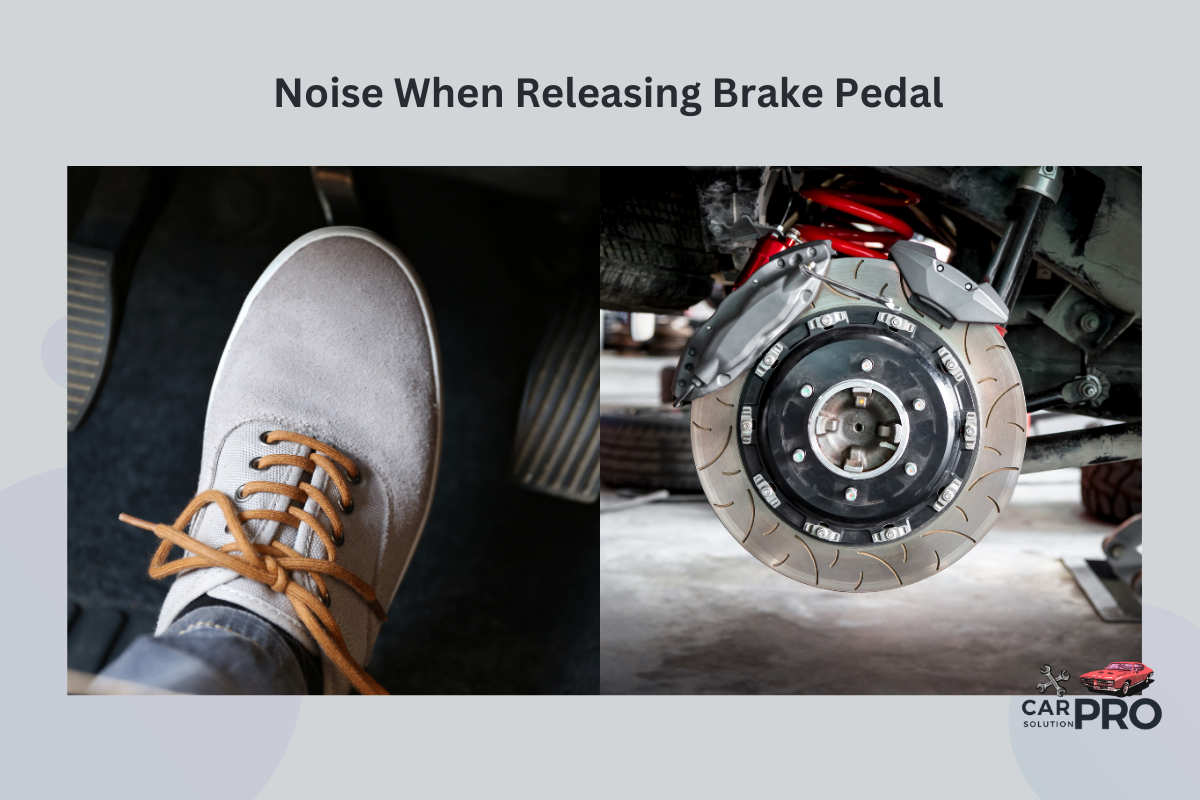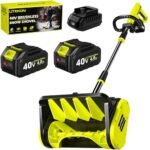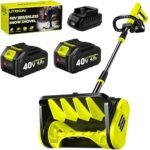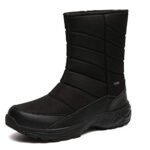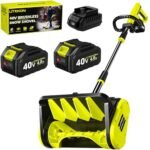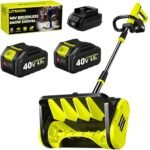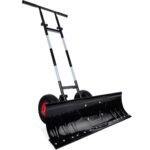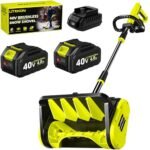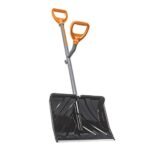Hearing a strange noise when releasing your brake pedal can be worrying. This sound often points to a problem in your brake system that needs attention. The most common causes of noise when releasing the brake pedal are a failing brake booster diaphragm, air leakage from the master cylinder gasket, or issues with brake components like calipers or pads.
Ignoring these noises can lead to more serious brake problems down the road. It’s important to identify the source of the sound and fix it promptly. Different types of noises can indicate various issues, from a simple need for lubrication to more complex mechanical failures.
Regular brake maintenance and prompt attention to unusual sounds can help prevent costly repairs and ensure your vehicle’s safety. If you’re unsure about the cause of the noise or how to fix it, it’s best to consult a professional mechanic for a proper diagnosis and repair.
Key Takeaways
- Unusual noises when releasing the brake pedal often indicate brake system issues
- Common causes include failing components, air leaks, or lack of lubrication
- Regular maintenance and prompt attention to brake noises help prevent serious problems
Common Causes of Noise
Brake noise when releasing the pedal can be caused by several factors. These issues range from normal wear and tear to more serious mechanical problems.
Worn Brake Pads
Brake pads naturally wear down over time. When they get too thin, they can cause a squealing or grinding noise when you release the brake pedal. This happens because the metal backing of the pad contacts the rotor.
Rust buildup on brake rotors can also create noise. If a car sits unused for a while, rust forms on the rotors. This causes a scraping sound when brakes are first used.
Some brake pads have built-in wear indicators. These small metal tabs make a high-pitched squeal when pads are low. It’s a warning to replace them soon.
Brake Pedal Mechanism Issues
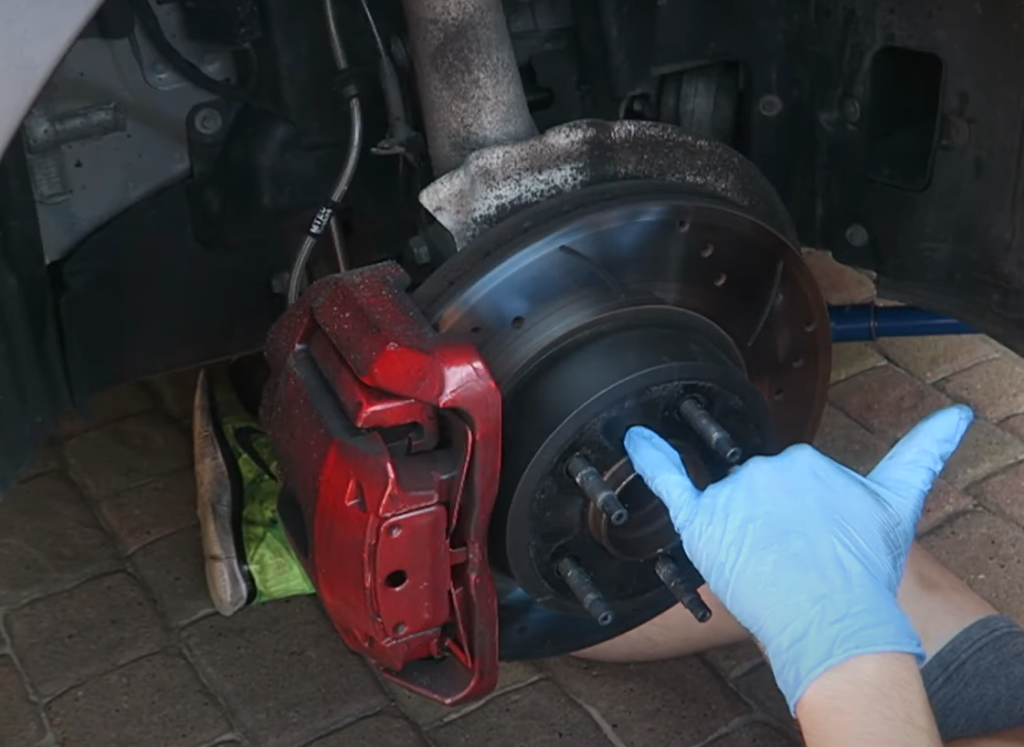
The brake pedal itself can be a source of noise. A loose or worn pivot point in the pedal assembly may create a clicking sound when released.
Faulty return springs can cause the pedal to stick slightly. This leads to a sudden release and a clunking noise.
Brake pedal bushings, when worn out, allow extra movement. This can result in rattling or squeaking noises as the pedal moves.
Lubricating pivot points and replacing worn parts often solves these issues. Regular maintenance helps prevent these problems from developing.
Power Brake Booster Problems
The power brake booster helps multiply the force applied to the brake pedal. When it has issues, it can create unusual noises.
A failing brake booster may produce a hissing sound. This happens when the vacuum seal is compromised, allowing air to leak.
Internal components of the booster can also wear out. This might cause a clunking noise when the pedal is released.
A weak check valve in the booster can lead to inconsistent pedal feel and noise. It may create a popping sound as vacuum is lost and regained.
Diagnosing the Problem
Figuring out why your brakes make noise when released involves careful inspection and testing. A step-by-step approach helps pinpoint the exact cause.
Visual Inspection
Start by looking at your brake system. Check the brake pads for wear. Thin pads can cause squealing or grinding noises. Look for any loose parts or debris stuck in the brakes.
Inspect the rotors for signs of warping or damage. Uneven surfaces can lead to noise when brakes are released.
Check brake lines and hoses for leaks or damage. Low brake fluid can cause air in the system, resulting in noise.
Auditory Examination
Listen closely to the noise when releasing the brake pedal. A squeaking sound may indicate worn brake pads. Grinding noises often mean metal-on-metal contact, suggesting severely worn pads.
A clicking noise could point to loose brake parts. Pay attention to when the noise occurs – right as you release the pedal or a moment after.
Try to pinpoint which wheel the noise is coming from. This narrows down the problem area.
Physical Testing
Test the brakes while the car is stationary. Press and release the pedal several times. Feel for any unusual vibrations or resistance.
Drive slowly in a safe area and apply the brakes gently. Note any pulling to one side, which may indicate a stuck caliper.
Check for a hissing noise when pressing the brake pedal. This could mean a vacuum leak in the brake booster.
Test the emergency brake. If it makes noise when engaged or released, the rear brakes may need attention.
Repair and Replacement Solutions
Fixing brake pedal noise often requires replacing worn parts or lubricating components. These repairs can restore smooth, quiet operation.
Brake Pad Replacement
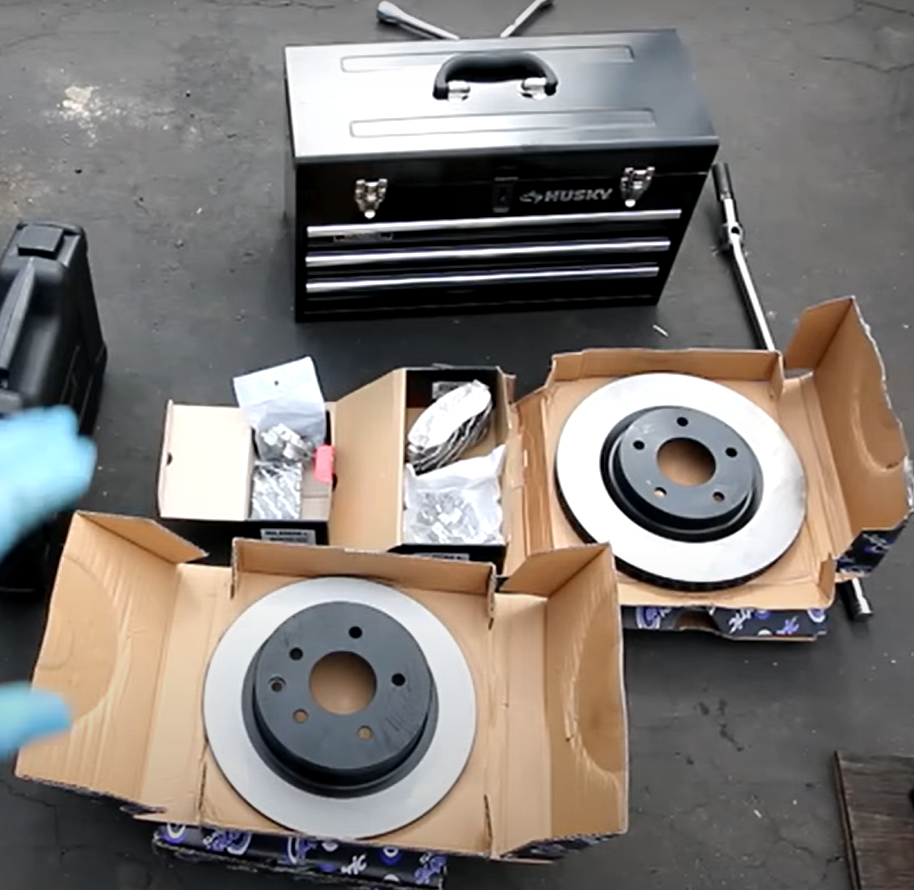
Worn brake pads are a common cause of noise when releasing the brake pedal. Check pads every 5,000 miles and replace them after 25,000 to 50,000 miles.
To replace brake pads:
- Remove the wheel
- Take off the caliper
- Remove old pads
- Install new pads
- Reattach caliper and wheel
New pads should eliminate squealing and grinding noises. Always replace pads on both sides of the axle for even braking performance.
Lubrication of Components
Lubricating key brake parts can reduce squeaks and squeals. Focus on metal-to-metal contact points.
Apply high-temperature brake grease to:
- Caliper slide pins
- Backing plate contact points
- Brake pad shims
Use a thin layer of grease. Too much can attract dirt and cause problems. Avoid getting grease on friction surfaces like rotors and pad material.
Regular lubrication during brake service helps prevent noise issues from developing.
Replacing Faulty Parts
Some brake noises require replacing damaged components. A faulty brake booster can cause clunking when releasing the pedal.
Signs of a bad brake booster:
- Hissing sound when pressing the pedal
- Hard brake pedal
- Increased stopping distance
Replacing a brake booster is complex. Most drivers should have a professional mechanic do this repair. Other parts that may need replacement include calipers, rotors, and brake hoses.
Always use quality replacement parts designed for your specific vehicle make and model.
Maintenance Tips
Regular brake maintenance helps prevent noise and ensures safe driving. Proper care extends the life of brake components and catches issues early.
Routine Brake Inspection
Check brake pads regularly for wear. Replace them when they get too thin. Look for uneven wear patterns that may signal alignment problems.
Examine rotors for warping or deep grooves. Smooth, even surfaces are key for quiet braking. Resurfacing or replacement may be needed if issues are found.
Inspect brake lines and hoses for leaks or damage. Ensure connections are tight and free of corrosion. Replace any cracked or frayed hoses promptly.
Test brake fluid levels monthly. Top up if low, using the correct type for your vehicle. Change the fluid entirely every 2 years or 24,000 miles.
Proper Lubrication Practice
Apply high-temperature brake grease to contact points between pads and calipers. This reduces squeaking and improves pad movement.
Lubricate caliper slide pins to ensure smooth operation. Clean pins thoroughly before applying fresh grease.
Use silicone-based lubricant on rubber components like bushings and seals. This prevents drying and cracking.
Avoid getting grease on brake pad surfaces or rotors. Excess lube can harm braking performance and cause noise.
Clean brake components with brake cleaner before lubricating. This removes old grease, dirt, and brake dust for better results.
Professional Services
Expert help is crucial for diagnosing and fixing brake noise issues. Certified mechanics have the skills and tools to properly assess the problem. They can also provide estimates for repairs and explain warranty coverage.
Certified Mechanics
Certified mechanics are trained to handle complex brake system repairs. They use specialized tools to diagnose the exact cause of noise when releasing the brake pedal. These professionals can identify problems like worn brake pads, damaged components, or other brake system issues.
Mechanics follow strict safety protocols when working on brakes. They can perform tasks such as:
- Inspecting brake pads and rotors
- Checking brake fluid levels
- Testing the brake booster
- Examining brake calipers
Choosing a certified mechanic ensures the job is done right. This reduces the risk of further damage or safety issues.
Warranty and Costs
Brake repair costs vary depending on the problem and vehicle type. Simple fixes may cost a few hundred dollars, while complex repairs can be more expensive. Many repair shops offer warranties on their work, giving customers peace of mind.
Warranties typically cover:
- Parts replacement
- Labor costs
- Follow-up adjustments
It’s important to get a detailed estimate before agreeing to repairs. Professional mechanics can explain the costs and warranty options clearly. They might also suggest preventive maintenance to avoid future issues.
Comparing quotes from different shops can help find a fair price. However, the cheapest option isn’t always the best. Quality work and reliable warranties are worth considering when making a decision.
Frequently Asked Questions
Brake noises when releasing the pedal can stem from various issues. Understanding these sounds helps pinpoint potential problems and necessary repairs.
What can cause a squeaking noise when I release the pedal after braking?
Squeaking noises often come from worn brake pads. As pads wear down, metal indicators can contact the rotor, causing squeaks.
Lack of lubrication on brake components can also lead to squeaking. Regular maintenance helps prevent these issues.
Is it normal for a vehicle to make a grinding sound after taking the foot off the brake pedal?
Grinding sounds are not normal and often indicate a serious problem. This noise may signal worn brake pads or rotors.
If left unaddressed, grinding can cause extensive damage to the brake system. Prompt inspection by a mechanic is crucial.
Why might there be a groaning noise when the brake pedal is released at low speeds?
Groaning noises at low speeds can indicate issues with brake calipers. Stuck or partially seized calipers may not fully release, causing this sound.
Rusty or corroded brake components can also produce groaning noises. Regular brake maintenance helps prevent these problems.
Are there common issues that lead to noises when the brake pedal is let go during a drive?
Several common issues can cause brake noises. These include worn brake pads, warped rotors, and loose brake components.
Foreign objects stuck in the caliper can also create noises. Regular inspections help identify these problems early.
Should I be concerned if my brakes are making noise upon releasing the pedal?
Brake noises should not be ignored. While some noises may be minor, others can indicate serious safety issues.
Consistent or loud noises warrant immediate attention. It’s best to have a professional inspect the brakes to ensure safe driving conditions.
What troubleshooting steps can I take if my car makes noise after I lift my foot from the brakes?
Listen carefully to identify the type of noise. Note when the noise occurs and if it changes with speed or brake pressure.
Check brake fluid levels and look for visible wear on brake components. If the noise persists, seek professional help for a thorough inspection and diagnosis.
When you purchase a product through Amazon links on carsolutionpro.com, we may earn a small commission at no extra cost to you. This helps support the site and keep our content free. As an Amazon Associate, we earn from qualifying purchases made through our links.
